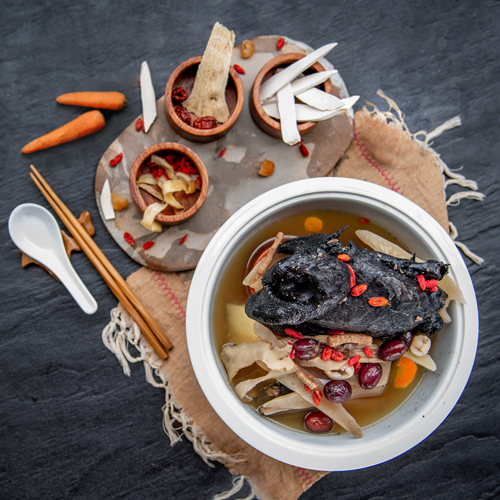Chinese Herbal Chicken Soup

Chinese herbal chicken soup is one of the best ways to strengthen the Qi and Blood to prepare for Autumn and Winter. Although the Chinese and Western views about when to eat chicken soup differ, both agree that chicken soup is a strong tonic to the system. Used in appropriate quantities, the herbs add complexity without making the soup taste medicinal. As the cool weather arrives, consider preparing some of this herbal soup to keep your family warm and colds & flus at bay!
Chicken/Ji is considered a great digestive tonic in traditional Chinese medicine. Cooking the chicken and giblets in a soup increases its ability to supplement the Jing-essence, marrow and Liver Blood. The best chicken to use in terms of its Chinese medicine attributes is Wu gu ji or Wu ji, the Silkie Bantam breed known as black chicken. Wu ji is used in China both as a food and medicine for nourishing the Yin and Blood. Wu ji has black colored bones, dark flesh, and black skin. Its taste is sweet and its temperature is neutral. The channels it enters are Liver, Kidney and Lung. Its primary functions are:
- Invigorates and Replenishes the Qi & Blood
- Nourishes Yin & Reduces Deficiency Heat
- Benefits the Spleen
- Strengthens Tendons and Bones
- Benefits Jing-essence
Shan Yao/Chinese wild yam is a gentle nourishing digestive tonic; it tonifies the Lungs, Spleen and Kidneys, both Qi and Yin, without being heavy or cloying. Lian Zi/lotus seed or fresh lotus root gently tonify the Spleen, Kidneys, stabilize the jing-essence, nourish the Heart and calm the Shen. Gou Qi Zi/wolfberries are a stronger but still well-balanced tonic; they tonify Liver Blood and brighten the eyes, nourish Lung and Kidney Yin, and mildly tonify Kidney Yang. Hong Zao/dried red jujube dates are another gentle and mild digestive Qi tonic, they also nourish the Blood, calm the Shen, and moderate any harsh or toxic properties of other herbs. Turnips, parsnips, sweet potatoes and carrots are root vegetables that absorb many vitamins and minerals from the soil as they grow, are high in antioxidants and contain lots of fiber. Root vegetables strengthen digestion; they benefit the Stomach and Spleen and increase the ability to digest food and absorb nutrients.
Although westerners are often encouraged to eat chicken soup to recover from colds and flus, according to traditional Chinese medicine chicken soup (especially when made with medicinal herbs) is a strong tonic that should only be used in cold and flu prevention, and not when suffering from a cold or flu.
Serves 6

INGREDIENTS:
- 1 free-range organic chicken (including the giblets), preferably black chicken if available, whole or cut into 4-8 pieces
- 2 tablespoons Shan Yao/Dioscorea opposita/Chinese wild yam
- 2 tablespoons Lian Zi/Nelumbo nucifera/lotus seed and/or 1 cup sliced fresh lotus root
- 2 tablespoons Gou Qi Zi/Lycium barbarum/wolfberries
- 8 Hong Zao/Ziziphus jujube/dried red jujube dates
- 1 turnip, sliced and quartered
- 1 parsnip, sliced and quartered
- 1 sweet potato, sliced and quartered
- 1 carrot, sliced
- 2 teaspoons sea salt, kosher or rock salt
- 4-8 cups of water
Add in for Wei Qi deficiency to benefit the immune system:
- 3-4 slices Huang Qi/Astragalus membranaceus/astragalus root
- 2 tablespoons Dang Shen/Codonopsis pilosula/codonopsis root
Add in for Qi and Yang Qi deficiency:
- ½ tablespoon Ren Shen/Panax ginseng/red ginseng
- ½ tablespoon Dong Chong Xia Cao/Cordyceps mycelium/cordyceps powder
Add in for Blood deficiency (these are very strong tasting!):
- 3 slices Bai Shao/Peony lactiflora root/peony root
- 3 slices Dang Gui/Angelica sinensis root/angelica root
- 8 slices Chuan Xiong/Sichuan lovage rhizome
DIRECTIONS:
- Rinse the herbs and let them soak in a bowl of fresh water for at least 20 minutes.
- Rinse and pat dry the chicken and giblets. You can leave the chicken whole, or cut into 4-6 pieces using a cleaver to cut through the bone so that the marrow can easily enter the broth.
- Rinse and slice the turnip, parsnip and carrot.
- Place all ingredients (herbs, chicken, giblets, vegetables and sea salt) in a large stockpot with only enough fresh cold water to cover (can vary, but usually between 4-8 cups); too much will not make a strong broth.
- Slowly bring to a boil over medium heat.
- Lower the heat to a medium-low and gently simmer for 1 hour or until chicken is tender and fully cooked.
- As the soup cooks, skim any impurities that rise to the surface. If necessary, add a little more water to keep the chicken covered while simmering.
- When chicken is tender, carefully remove to a cutting board. When it is cool enough to handle, discard the skin and bones, cut the meat into small pieces or use two forks to shred, and return to the stockpot.
- Remove from heat and serve warm.
- Optional: strain the herbs out (most are quite edible, the “add on” herbs for Wei Qi deficiency and Blood deficiency a bit stronger tasting.)


